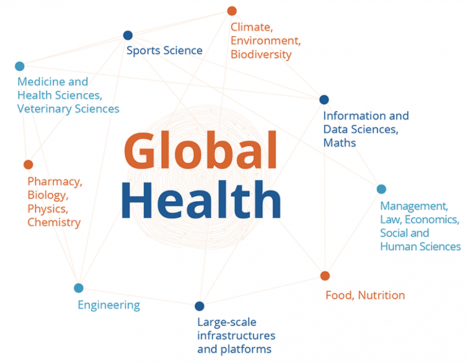
C-BASC and training
A driving force for proposals
The Graduates Schools of the University of Paris-Saclay have the mandate to design and administer graduate training. C-BASC's role is to work with them to propose innovative interdisciplinary training that is consistent with their research strategy and the needs of the "jobs of tomorrow". C-BASC is associated in particular with 5 Graduate Schools:
Our initial proposals
C-BASC's training proposals were presented at our Launch Conference. They relate to:
- Proposal of interdisciplinary master/engineer/doctoral pathways in connection with the Graduates Schools: (i) Sustainable peri-urban territories, (ii) Sustainable food systems, (iii) Biomathematics
- Creation of summer schools for PhD students
- Possible development of a network of former graduates of the University of Paris-Saclay in our field
- Strengthening the links between training-research-innovation
- Reflection on the undergraduate level
- Continuing education
Discover on this link the training projects realized so far.
Masters and doctoral schools associated with C-BASC
You will find below the list of masters and doctoral schools of the University Paris-Saclay concerned by our themes, with which we are called to collaborate. In addition, there is the European University Alliance for Global Health.
Masters
AETPF " Agrosciences, Environment, Territories, Landscape, Forest " : This Master's degree trains scientists who will be involved in agricultural production, the environment and the governance of landscapes and territories.
BEE "Biodiversity, Ecology and Evolution": This Master's degree trains students capable of understanding and solving biodiversity problems based on a good knowledge of ecology, evolution and the functioning of living organisms in interaction with their environment.
"Bioinformatics": The Bioinformatics Master's degree focuses on the high-level research and development needs of companies and research organizations in bioinformatics, biostatistics and biotechnology, as well as in life sciences and agronomy.
"Life sciences and Health": This master's degree provides a foundation of scientific knowledge and common skills and takes into account the reciprocal issues of biology and health. The main link with C-BASC is the M2 Gen2EV Master's degree: Genetics, Genomes and Evolution - whose objective is to train M2 students in the concepts and technologies of today's genetics and genomics, regardless of the biological model.
Political Economy and Institutions - This master's degree in economics trains students to become specialists in regional planning issues, with an emphasis on institutional approaches, as well as managers in various fields at the crossroads of public policy: planning, tourism, sports and nature recreation, environmental preservation, etc., in connection with local or international institutional actors.
EEET "Environmental, Energy and Transport Economics": This Master's degree structures training in environmental economics in the Paris region, and is the main Master's degree on this theme in France.
Development and Environmental Studies: This Master's degree aims to enable graduates to mobilize the concepts, tools, methods and approaches of the social sciences in their application to environmental and development issues.
GTDL "Land Management and Community Development": This master's degree aims to provide students with the skills needed to analyze and anticipate, raise awareness, train and mobilize actors around adaptive and innovative collective strategies.
NSA "Nutrition and Food Sciences": This master's degree trains students to understand the interactions between food, diet and more broadly food systems and the health of individuals and populations. It brings together many disciplines such as food science and processes, consumer science, microbiology, toxicology, nutrition, epidemiology, neuroscience. This master includes the joint Erasmus Mundus master "Food Innovation and Product Design (Fipdes)".
"Political Science": The objective of this Master is to provide training in political science related to public policy. More specifically, it focuses on three main themes: local and national public action; international public action; and policy-related communication.
"Sociology": The Master's degree in sociology aims to train advanced specialists in this field of study. Trained in the theoretical and methodological developments of sociology, graduates will be able to apply their knowledge in a variety of demanding and stimulating professional contexts, primarily in research and higher education in the social sciences, and as experts in public and private organizations.
Doctoral schools
ABIES " Agriculture, food, biology, environment, health " : is a thematic doctoral school. thematic which gathers the following research fields: Agronomic and environmental sciences, planning, landscape sciences and techniques (38% of doctoral students), Food sciences (13%), Life and health sciences, plant and animal sciences (30%), Economic, social and management sciences applied to agriculture, food and the environment (14%), Engineering sciences applied to life and the environment (5%).
SEVE "Plant Sciences: from genes to ecosystems" is the only French doctoral school dedicated to the study of plants and their relations with the environment. Research covers a wide range of disciplines such as genetics, genomics, cellular and molecular biology, physiology and metabolism, ecology and ecophysiology.
SDSV "Structure and Dynamics of Living Systems": is a doctoral school of biology that approaches research in its fundamental and applied aspects.
SDSV " Sciences de l'Environnement d'Ile de France " : covers multidisciplinary fields related to the understanding of the physical, chemical and biological balances of the terrestrial environment.
Other
The European University Alliance for Global Health (EUGLOH): brings together 5 universities: the University of Paris-Saclay (UPSaclay), the University of Lund (LU), the Ludwig-Maximilians-Universität München (LMU), the Universidade do Porto (UPorto) and the University of Szeged (USZ), to develop a European campus in global health.

